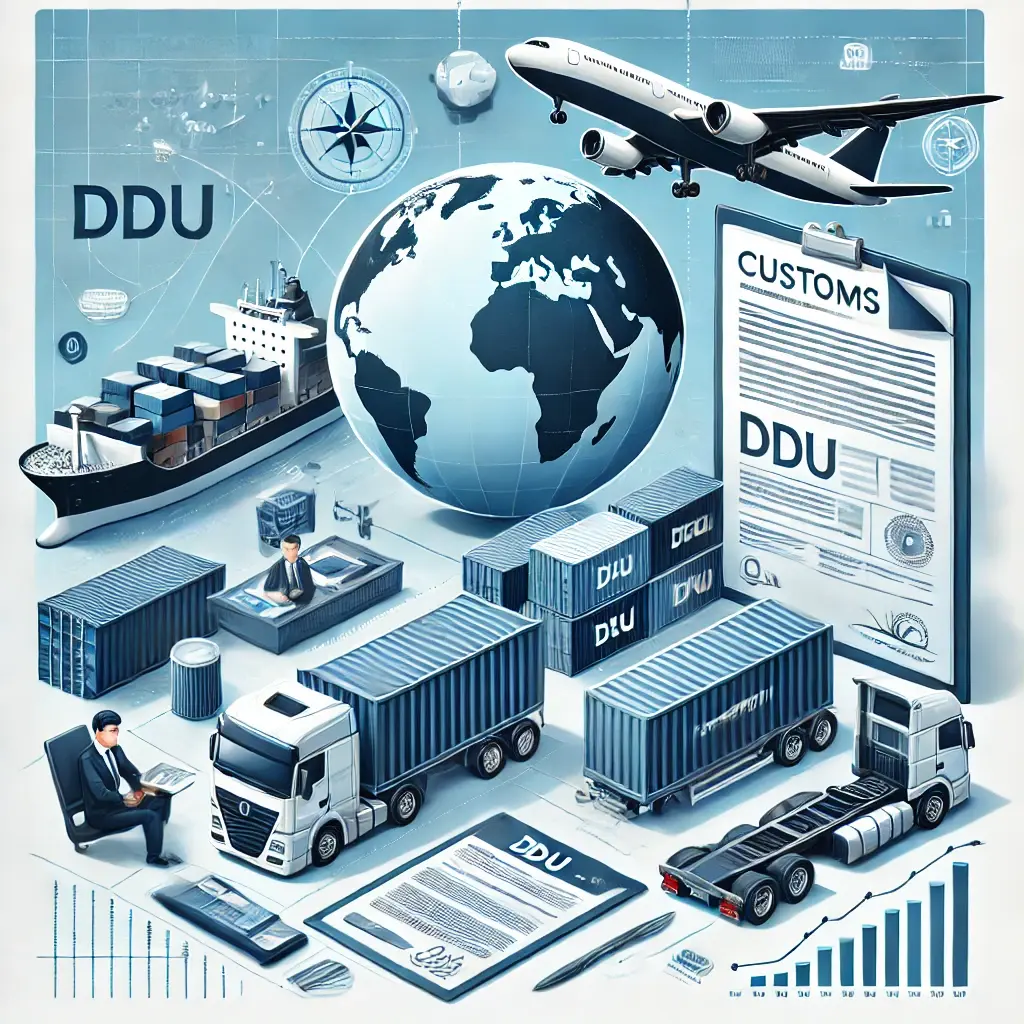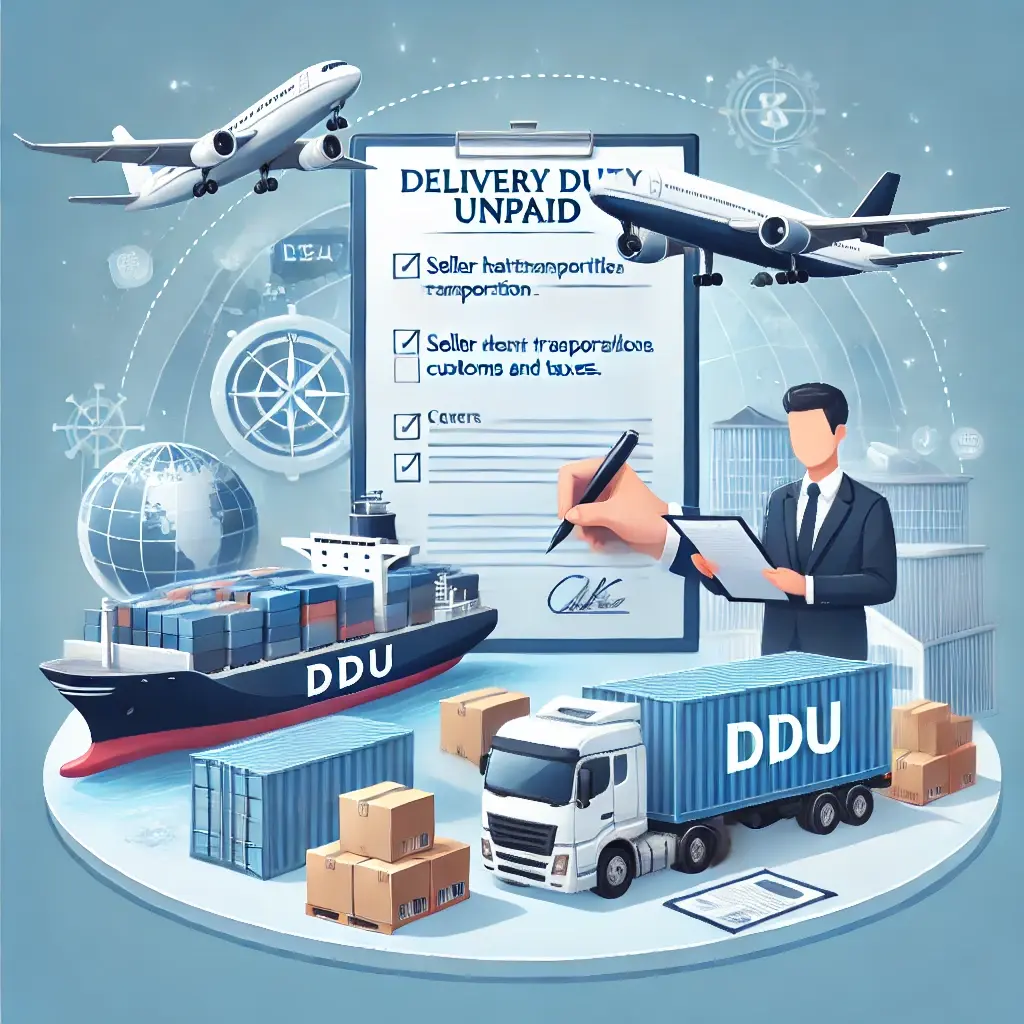If you have ever considered importing goods from China or another country, you have probably come across DDU incoterms (Delivery Duty Unpaid). You might be wondering how they work, what your responsibilities are, and whether DDU is a good fit for your business. In this comprehensive guide, you will find everything you need to know about shipping under DDU terms. Moreover, you will discover tips on how to minimize risks, keep costs low, and maintain a smooth logistics flow.
I have crafted this post to be both user-friendly and helpful in answering your most pressing DDU-related questions. By the time you finish reading, you will understand exactly how DDU incoterms align with your shipping strategy and whether they are the optimal choice for your supply chain. Let’s dive in!

Top Key Points You Need to Know About DDU Incoterms
| Topic | Key Takeaway |
|---|---|
| Definition of DDU (Delivery Duty Unpaid) | You receive goods at a named destination but remain responsible for customs clearance and duty payment. |
| Seller’s Obligations under DDU | The seller pays all transport costs to the agreed place, handles export formalities, and bears all risks in transit. |
| Buyer’s Obligations under DDU | You must handle import procedures, pay duties and taxes, and assume risks after goods are delivered. |
| Comparison with Other Incoterms | DDU offers different cost/risk splits than DDP, FOB, CIF, EXW, etc. Carefully choose one that fits your business. |
| DDU vs. DAP | DDU (from Incoterms 2000) is replaced in Incoterms 2010 by DAP (Delivered at Place). They share similar concepts. |
| Potential Risks | Sellers might face higher transport costs, while buyers risk delays if customs clearance documents are not prepared. |
| Recommended Scenarios | Use DDU if you (the buyer) can easily handle import processes, or if the seller prefers not to engage in local customs. |
| Overall Goal | Clarity in responsibility. Make sure you understand your role in shipping, clearance, and costs. |
1. Understanding the DDU Concept and Background
You may have heard of Incoterms—the international commercial terms set by the International Chamber of Commerce (ICC). They define the responsibilities of buyers and sellers in global trade. One common (but now somewhat outdated) Incoterm is DDU or Delivery Duty Unpaid.
What Does DDU Mean?
Under DDU, the seller delivers goods to a named destination. You, as the buyer, agree to handle customs clearance in your country and pay any duties or taxes that your government requires. These might include import duties, VAT, or other customs-related fees. Essentially, your supplier shoulders the transport risks and costs until the goods reach your local port or agreed location. After that, you are responsible for obtaining import documents, paying taxes, and completing final delivery to your warehouse or retail store.

DDU’s Relationship with Other Incoterms
In Incoterms 2000, DDU was a popular choice for many buyers who wanted to reduce transport risks while taking care of their own import procedures. Then came Incoterms 2010, which replaced DDU with DAP (Delivered At Place). Despite this update, you may still see DDU used in contracts today. That is usually because older habits die hard, and many small to medium businesses still prefer to use the term DDU.
Hence, if your supplier refers to DDU, you can quickly compare it with the more modern DAP. Both mean that the seller bears responsibility until goods arrive at a named place, while you handle customs clearance and duties at import. The main difference is simply that DDU was an official term under Incoterms 2000, and DAP is its current, official replacement under Incoterms 2010.
Why DDU Still Matters
You might be curious why DDU is still relevant, even though Incoterms 2010 replaced it. In practice, many businesses rely on shipping frameworks or contract templates that have not been updated. Additionally, some companies find DDU easier to understand because of established processes and relationships with freight forwarders.
You will also find that many shipping forums and older legal documents still reference DDU. Because of this, it is worth exploring in detail—especially if you run into a Chinese supplier who insists on using “DDU” in your contract.
2. Seller’s Obligations Under DDU
If you are a buyer evaluating DDU, you need to know what your seller will handle. In DDU shipping, the seller is responsible for many key steps before goods reach your port.
- Providing Goods and Commercial Documents
The seller must give you the correct goods in the right quantity, quality, and packaging. They must also supply commercial invoices or similar documents to prove ownership and pricing. - Licenses and Permits for Export
Under DDU incoterms, the seller must secure export licenses, plus any paperwork for transit through other countries. If they fail to handle these correctly, your goods could be detained, causing delays and extra storage fees. - Transportation and Insurance (Until Destination Port)
The seller pays all shipping charges to bring your goods from, for example, a manufacturing plant in Shenzhen to your destination port. However, DDU does not automatically cover insurance. If you want insurance, you should specify that in your contract. Otherwise, you may have to cover it. - Delivery of Goods at Agreed Place
The seller is expected to deliver goods to a named place (often a port, freight terminal, or cargo hub). You must ensure that both parties have agreed on exactly which location qualifies as “delivery” to avoid confusion. - Risk Transfer
Under DDU, risk of loss or damage remains with the seller until the goods arrive at that agreed place. Once they are available for your disposal, risk transfers to you. - Cost Division
The seller bears all costs leading up to delivery, including export clearance fees. It means that you typically do not pay for ocean freight or trucking in the seller’s country. You do, however, pay all import-related fees in your own country. - Notification to Buyer
The seller must let you know when goods have shipped and when you can expect arrival. This gives you time to prepare your customs procedures and any final-mile arrangements. - Proof of Delivery and Transport Documents
As soon as the goods are shipped, the seller must hand over relevant shipping documents (Bill of Lading, Air Waybill, or other transport documentation) so you can clear customs upon arrival. If your contract calls for digital documents, they can deliver them via email or an Electronic Data Interchange (EDI).
By fulfilling these obligations, the seller meets their part of the DDU terms. However, to avoid misunderstandings, you should clearly state every detail in your purchase agreement.
3. Buyer’s Obligations Under DDU
Under DDU incoterms, your duties as the buyer focus primarily on clearing and paying for import fees. Additionally, you pick up some risk after goods arrive at the named destination. Let’s review your key responsibilities in detail:
- Paying for Goods
As with all incoterms, you must pay the invoice amount on time and in the manner specified by your contract. - Obtaining Import Licenses and Permits
You must handle all procedures related to import clearance. This means having the right paperwork, customs broker, or a freight forwarder in your country who knows your local regulations. If you do not have these ready, your goods could be stuck at the port. - Accepting Delivery
Once your supplier notifies you that the cargo has arrived, it is your job to collect the goods. At times, you can arrange a third party (like a forwarder) to handle the actual pick-up. The contract should mention who will do the final pick-up from the warehouse or terminal. - Risk Transfer After Delivery
The moment your goods arrive, you assume the risk of any damage, loss, or storage fees. This is why you want to move them out of the port as quickly as possible. Delays can lead to demurrage charges or additional port fees. - Cost Division
You pay any costs that occur after the seller has delivered the cargo to the named place. Typical costs include import duty, customs tariffs, VAT (if applicable), port fees, local trucking, or final-mile deliveries. - Notification to Seller
While the seller handles dispatch, you need to confirm the place and timeline for safe delivery. If you change the final delivery location mid-shipment, extra charges may apply, and the risk might shift to you sooner. - Proof of Delivery and Transport Documents
You must accept the documents from the seller if they match your contract. Keep them accessible in case customs authorities require extra checks. - Goods Inspection
If you plan any pre-shipment inspections for quality control or other regulations, you handle those costs. However, if your home government mandates an inspection at origin, the seller might be responsible. Make sure your contract clarifies who pays for which inspection.
Clearly, buying under DDU incoterms shifts the customs complexity to you. That is why, if you are new to importing, you may want to hire a customs broker or use a freight forwarder’s assistance.
4. DDU Compared with Other Common Incoterms
Choosing the right incoterm is vital, especially when you are negotiating with Chinese suppliers. So let’s explore how DDU measures up next to other frequent terms:
DDU vs. DDP
- DDP (Delivery Duty Paid): The seller pays for import duties, customs fees, and taxes. You only take ownership when the goods are fully customs-cleared.
- DDU (Delivery Duty Unpaid): You pay these costs instead. This gives you more control but adds responsibility.
Thus, DDP can save you time but usually costs more. DDU can be cheaper overall if you are familiar with your local customs processes.
DDU vs. EXW
- EXW (Ex Works): The seller’s only duty is to make the goods available at their factory or warehouse. You handle everything else, from loading at origin to final delivery at your destination.
- DDU: The seller ensures international freight to your port or named place. You just handle import duties and final distribution.
If you want minimal responsibility on your supplier, you can choose EXW. However, EXW often leads to a bigger workload for you, which can be complicated if you are not experienced with overseas shipping.
DDU vs. CIF/CIP/CPT
- CIF (Cost, Insurance and Freight): The seller pays for maritime freight and minimum insurance to the port of destination. You cover import taxes and local charges afterward.
- CIP (Carriage and Insurance Paid to): Similar to CIF, but suitable for other modes of transport like road or rail. Again, you handle local import duties.
- CPT (Carriage Paid To): The seller pays freight to your named destination, but once the goods are handed to the carrier, you bear the risk.
In contrast, DDU means the seller remains responsible for the goods until delivery to the agreed location. You cover duties and taxes once they arrive.
DDU vs. FOB
- FOB (Free on Board): The seller is responsible only until goods are loaded onto the vessel. Afterward, risk transfers to you, the buyer.
- DDU: The seller bears the risk for the entire journey until your port, so there is a huge difference in cost structure and accountability.
5. The DDU Shipping Process: Step by Step
You might be asking yourself: “How exactly does DDU shipping work from start to finish?” To help you visualize the process, let’s walk through the key steps in chronological order.
- Contract and Negotiation
You negotiate with your supplier. If you both agree to use DDU, confirm the named place of delivery, responsibilities, price terms, and any extra services (like freight insurance). - Seller Prepares Goods and Export Clearance
Your supplier arranges packaging, labeling, and necessary inspections. They secure export licenses, certificates of origin, and any other export formalities. - Seller Books the Carrier and Pays Freight
Under DDU, your supplier typically chooses the carrier. They pay for ocean freight, air freight, or trucking (depending on the mode) up to the named port or terminal. - Transport to the Port of Departure
The supplier manages local trucking or rail transport to get goods from the factory to the port. They also handle cargo loading and any terminal handling charges on the origin side. - Main Transportation
This could be ocean shipping, air cargo, or multimodal transport. Throughout this journey, the seller is still responsible for risk and cost. - Arrival at Destination
Once the ship or plane reaches your local port or cargo terminal, the carrier notifies your supplier or your forwarder that goods are available. This is where the risk typically transfers to you. - Import Customs Clearance
Now it is your turn to step in. You submit documents (commercial invoice, Bill of Lading, packing list, and any permits) to customs. You pay duties, taxes, or any other fees required. If you are unsure about these steps, it is wise to hire a customs broker or ask your freight forwarder for help. - Final Delivery
After your cargo clears customs, you pay any local handling or port fees. You can then arrange a truck or local courier to pick up the shipment and deliver it to your warehouse or shop.
6. Potential Issues and Risks When Using DDU
Using DDU can simplify some aspects of shipping but also introduces possible challenges. Before you finalize that DDU contract, consider these factors:
- Seller’s Financial Risk
The seller covers transportation to your destination. If freight rates skyrocket, they could lose money. This may lead them to push you to renegotiate or to ship differently. - Buyer’s Customs Risk
You take full responsibility for clearing customs. If you fail to provide the right documents or if you have licensing issues, you can end up with delays, extra port charges, or even legal troubles. Always check your country’s import regulations before finalizing the shipment. - Hidden Fees
Terminal handling charges, storage fees, or special local taxes can appear unexpectedly. Under DDU, the seller might not mention these costs during negotiation. You need to research or ask about possible “destination charges” in your port. - Coordination and Communication
DDU shipping often involves a delicate handover at the destination port. You need seamless communication with your supplier, the carrier, and possibly a customs broker. If messages get lost, you might not know when your cargo arrives or if there is a clearance issue. - Documentation Errors
Incomplete or inaccurate export documents can cause your goods to be stuck at customs. Because you rely on the seller’s paperwork, you should verify that everything is correct before the goods leave the origin. - Complex Payment Methods
If you rely on letters of credit or documentary collections, DDU can complicate matters. Some banks might require confirmation that all duties are prepaid. But in DDU, that is not the case. Be sure your payment terms match your incoterm.
7. Frequently Asked Questions About DDU Incoterms
You might be seeking concise answers to specific DDU-related questions. Below are some FAQs that typically arise when dealing with DDU shipping:
- Are DDU Incoterms Still Valid?
Yes. Although replaced by DAP in Incoterms 2010, many businesses still use DDU. There is no legal prohibition against it. You simply need to ensure it is clearly stated in your contract. - Who Pays the Freight, Local Destination, and Destination Charge if the Incoterms Are DDU?
The seller pays the freight charge until the agreed place. You pay local destination charges, import duties, taxes, and any final delivery expenses after customs clearance. - Which Is Better: DDU or DAP?
They are largely similar in concept. DAP is the current standard term. However, if your supplier is used to DDU, you can stick with it. Just ensure your contract clarifies who handles customs clearance and who pays any duties. - What Is the Difference Between DDU and DDP?
Under DDP, the seller handles import duties, taxes, and all formalities. Under DDU, you handle import costs and procedures. Choose DDP if you want fewer customs headaches. Use DDU if you want to control the import process and possibly save on costs. - Is DDU Suitable for Air Freight?
Yes, DDU applies to all modes of transport. You can use it for ocean shipping, air freight, trucking, or rail. Just be sure you specify the named place for delivery. - Do I Need Insurance Under DDU?
DDU does not mandate insurance. If you want insurance, you should request it separately or arrange your own cargo policy. Some buyers prefer incoterms like CIF or CIP if they want the seller to bear insurance costs. - What Happens if I Cannot Clear Customs Under DDU?
You could face port storage fees, demurrage charges, or even seizure of goods by local authorities. Always ensure that you have a reliable customs broker, correct documentation, and enough funds to pay applicable duties. - Can I Still Use a Letter of Credit with DDU?
Using a letter of credit is possible but can be more complex. Some banks want proof that all duties are prepaid, which conflicts with the nature of DDU. Communicate with both your bank and your supplier to confirm acceptable payment terms.
8. Final Thoughts and Recommendations
By now, you should have a solid understanding of DDU incoterms and how they can affect your import operations. You have seen that DDU places significant responsibility on the seller for transportation and risk management until goods arrive in your country. However, you must step up once the cargo hits your port, managing customs clearance and paying any duties or taxes. This arrangement can be beneficial if you are confident about import procedures and local regulations. Conversely, if you dislike dealing with customs headaches, you may want to explore DDP or hire a dedicated freight forwarder.
In essence, DDU shipping comes down to clear contract terms and proactive planning. If you believe DDU suits your business, here is how you should proceed:
- Negotiate Thoroughly
Make sure your supplier understands which costs they will pay and which costs you will pay. Check if they have experience in shipping to your country. Ask about potential local fees at the destination. - Prepare Your Customs Process
If you have not already, consider hiring a reliable customs broker. You want someone who can expedite the clearance process, spot paperwork mistakes, and guide you on relevant taxes or import restrictions. - Ensure Accurate Documentation
Ask your supplier for draft shipping documents before the goods depart. Verify that the details match your purchase order, quantity, and HS codes. This small step can save you time and money. - Maintain Good Communication
Stay in touch with your supplier, carrier, and local authorities. If you sense potential delays, address them before the cargo arrives. Keep your phone or email open for customs queries. - Consider Your Incoterm Alternatives
If you find that clearing goods is overly complex, you might switch to DDP for a more streamlined door-to-door service. On the other hand, if you want complete control over logistics, consider incoterms like EXW or FOB.
Remember: The best incoterm is the one that aligns with your capabilities and your budget. Sometimes, paying your supplier a bit more for fewer headaches is worth the premium. Other times, you can handle the details yourself and potentially save on costs. Ultimately, clarity is everything. Make sure you have every detail written in your contract, from cargo handover points to who pays which fees.
Engage with Us
Do you have other burning questions about DDU shipping or related incoterms? Are you still uncertain whether you should choose DDU or DAP for your next import from China? Feel free to reach out in the comments, or send your questions directly. This blog is here to help you master global logistics. By understanding incoterms like DDU, you are on the path toward smoother, more cost-effective shipments.
Stay proactive, keep researching, and communicate effectively with all parties involved in your supply chain. With the right approach, you can navigate import duties, avoid hidden fees, and keep your deliveries on track. Good luck with your next shipment under DDU terms!


